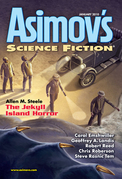
| Editor: | Sheila Williams |
| Issue: | Volume 34, No. 1 |
| ISSN: | 1065-2698 |
| Pages: | 112 |
The non-fiction always gets a boost from James Patrick Kelly's column. This one looks at the perils of predicting the future, and the other directions in which SF has turned. The Silverberg column looks at a fascinating recovered artifact that may be a computer, and about which I now want to know more, and Williams's editorial (more interesting than many) looks at the definition of a magazine. Di Filippo's review column once again focuses on small presses and shows his unerring ability to pick out work I'm uninterested in.
"Marya and the Pirate" by Geoffrey A. Landis: The best story of this issue is the first one. "Marya and the Pirate" starts out as a classic space adventure story, showing a daring raid on an in-system cargo transport, but then turns into a great dynamic between two memorable characters. It also does a lovely bit of undermining of "The Cold Equations," which I have to believe was intentional and which I enjoyed a great deal. The characters and resolution are, in retrospect, a bit stock, but the twists along the way were worth the reading. Recommended. (8)
"Conditional Love" by Felicity Shoulders: Shoulders's first story, "Burgerdroid," was worth an award nomination and was the best story of that issue, so I was looking forward to this one. "Conditional Love" is more heart-breaking than angry but carries the same sharp emotional punch as her previous story. The protagonist is a nurse working in a pediatric hospital for gene-engineered children, handling cases where that engineering has gone horribly wrong. The new admission is a boy whose memory resets each time he sleeps and who reforms a maternal bond each time he wakes up, but the scene-stealer is his roommate, a girl born without limbs who's been in the hospital for nearly her whole life. "Conditional Love" takes an unflinching look at care, love, and hard choices, and while I found it a bit too painful to be the best story of this issue, it's a strong competitor. (7)
"A Letter from the Emperor" by Steve Rasnic Tem: I'm impressed by the range of this issue. We go from a near-future hospital to the far-future reaches of a crumbling space empire, one that's surviving on momentum and a bureaucracy so large that it's now unclear if there's anything at the top. The protagonist is a messenger to far-flung outposts, and arrives as the representative of an empire and civilization that he's not sure he believes in to a base hungry for contact with it. It's a story about symbols, expectations, and the justifications people construct for their lives, and I found it moving despite an unsatisfying ending. (7)
"Wonder House" by Chris Roberson: This is, in theory, set in the same alternate world as Roberson's solid SF about Chinese and Aztec space programs, but this is more of a humor story about an alternative version of the 1930s pulp publishing industry. I lack the fascination with pulps and the other (spoiler) source material required to really enjoy this story, but it's occasionally funny to see how Roberson twists pulp material for his alternate world. And it's short and to the point. (6)
"The Good Hand" by Robert Reed: It's rare to see a magazine story that's this sharply political, and I don't recall seeing one like this from Reed before. It's a story about an alternate present in which the US had successfully maintained its nuclear monopoly to the present day and enforced it on the entire world, using roaming inspectors who sought out signs of radiation from hidden weapons programs. The protagonist is an American salesman traveling in France, a man who accepts the US policy as obvious good sense and is a painful demostration of the well-meaning arrogance of it. Reed uses that setup to stick a knife of a story into typical US justifications for actions against supposedly dangerous countries and then gives it a nasty twist. I suspect this is, sadly, one of those stories that will be enjoyed by people who already agree with it and hated by people who don't, but I'd like to believe it will make someone think. (7)
"Wilds" by Carol Emshwiller: Like so many of Emshwiller's stories, "Wilds" is about the boundaries of what it means to be human, about outsiders, and about clashes of perspectives. The first-person protagonist is a wild man, someone who's left civilization to live as much like an animal as possible, but who is forced into a human connection when a woman flees into the area in which he lives. The story did draw me in, but I never could quite place the point or narrative arc of it, and the ending did little to help. It's saying something, I think about what rejection of civilization means and the toll it carries, but I can't put a finger on it. The overall impression was unsatisfying. (5)
"The Jekyll Island Horror" by Allen M. Steele: This is a half-horror, half-adventure story about strange events on an island off the coast of Georgia that is home to a gentleman's retreat. It's told in a somewhat formal, old-fashioned "true story" tone with a frame story saying that it's an account retold to the author by a local resident of the island many years later. The events are more SFnal than Lovecraftian, but the tone of strange creatures that men shouldn't meddle with and the sense that something bad could happen at any moment are familiar from horror. There's nothing here I found new or striking — it's an old pulp adventure sort of story — but it's competently told. (6)
Reviewed: 2011-05-11